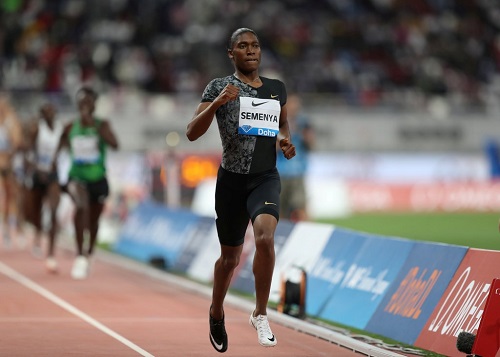Caster Semenya of South Africa, a two-time Olympic champion at 800 meters, will not be eligible to run her signature event at this year’s world track and field championships after the latest legal ruling in an ongoing, highly-charged case about testosterone levels and restrictions placed on intersex athletes to compete in certain women’s events.
Semenya sustained a setback on Tuesday, when the Swiss Supreme Court reversed a decision it made in June and, temporarily at least, reimposed the hormone restrictions set forth by track and field’s world governing body in women’s events from 400 meters to the mile.
“I am very disappointed to be kept from defending my hard-earned title,†Semenya said in a statement about her ineligibility to run the 800 at world track championships, to be held from Sept. 28-Oct. 6 in Doha, Qatar. But, she added, “this will not deter me from continuing my fight for the human rights of all of the female athletes concerned.â€
Despite Tuesday’s interim ruling, Semenya’s attorney said she planned to continue an appeal. She is seeking to overturn eligibility limitations placed on athletes in the affected women’s events who have disorders of sexual development and possess X and Y chromosomes, the normal male pattern. These women produce testosterone in what scientists refer to as the “male range.â€
Dorothee Schramm, the lawyer, told reporters, “We will continue to pursue Caster’s appeal and fight for her fundamental human rights. A race is always decided at the finish line.â€
Track and field’s governing body, the International Association of Athletics Federations, or I.A.A.F., said it would wait to respond until the Swiss Supreme Court issues a fuller explanation of its decision, which is expected Wednesday.
In June, the Swiss court temporarily suspended the rules governing testosterone levels, which allowed Semenya to continue running the 800 this summer. She is undefeated in the event since 2015 and, if eligible, would be a heavy favourite to win a third gold medal at the 2020 Olympics in Tokyo.
A statement Tuesday by Semenya’s representatives said the Swiss court reversed itself upon determining that Semenya had failed to meet the “strict requirements and high thresholds†necessary to continue the interim suspension of the I.A.A.F.’s testosterone rules.
In women’s events from the 400 to the mile, which combine speed and endurance, the I.A.A.F. has argued that athletes with testosterone in the male range gain an unfair advantage in muscle strength and oxygen-carrying capacity.
In May, the Court of Arbitration for Sport ruled that the restrictions imposed by the I.A.A.F. were discriminatory but were a “necessary, reasonable and proportionate means†of achieving track and field’s goal of providing and level playing field and preserving the integrity of female competition.
While more cultures are moving toward acceptance of gender fluidity, supporters of the CAS ruling said it affirmed the sports world’s need for distinct gender lines.
To preserve their eligibility in the restricted events, intersex athletes would be required to lower their testosterone levels for six months before competing and to maintain those lower levels. But Semenya has refused to undergo hormone therapy.
She has called the rule medically unnecessary, as well as “discriminatory, irrational, unjustifiable†and a violation of the rules of sport and universally recognized human rights. She has accused the I.A.A.F. of specifically targeting her.
Semenya has received support from the United Nations Human Rights Council and the World Medical Association. The medical group has called on doctors not to take part in implementing the I.A.A.F. testosterone rule, which the group said was based on “weak evidence†from a single scientific study that is “currently being widely debated by the scientific community.â€
If Semenya loses her appeal to Switzerland’s top court, she could preserve her Olympic eligibility in Tokyo by running a longer event like the 5,000 meters, which does not carry restrictions on testosterone levels. But she would not be considered a medal favourite.
Before the court had allowed her to run the 800 meters this summer, Semenya had signed up to run a 3,000 meter race in late June.
As of Tuesday, her supporters were left with a cryptic tweet by Semenya that said, “First chapter of my life done, looking forward to my second chapter.â€
READ ALSO:
- Roger Pielke comments on Semenya/ASA vs IAAF
- Caster Semenya: Swiss court rejects IAAF request to re-impose testosterone rules
- Caster Semenya loses landmark testosterone rule case
Source: Nytimes.com





